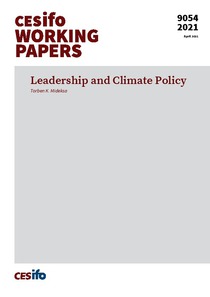Leadership and climate policy

CESifo - Munich
2021
39 p.
environmental policy ; climate change ; international agreement ; international relations ; leadership
CESifo working paper
9054
Social sciences
https://www.cesifo.org/en/publikationen/2021/working-paper/leadership-and-climate-policy
English
Bibliogr.
"This paper examines leadership in relation to supplying a global public good. Both the Kyoto Protocol and the Paris Agreement encourage the developed countries to take a lead in reducing emissions. Does a country benefit from taking a lead? When does leadership improve global welfare? The answer depends on how transparent the leader's abatement technology is for the followers. When there is no transparency and the leader has to abate to signal the abatement cost, leadership reduces global welfare unless the crowding-out effect is weak. If there is transparency and the follower can benefit from technology spillover effects, leadership reduces global welfare unless the spillover effect is sufficiently large. I find that transparency reduces global welfare unless the spillover effect is sufficiently large and the difference in abatement cost is small. This theory can rationalize the European Union's stance on climate policy while also explaining the perceived failure of the Kyoto Protocol."
Digital
The ETUI is co-funded by the European Union. Views and opinions expressed are however those of the author(s) only and do not necessarily reflect those of the European Union or the ETUI.